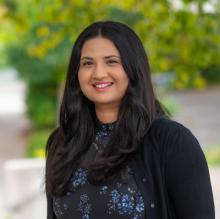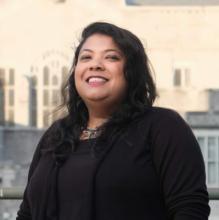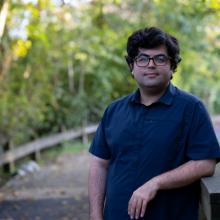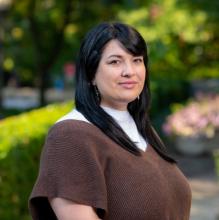Being a public scholar means upholding my commitments to community-engaged research and finding new ways to do this from within the academy. Returning to school has given me the opportunity to explore challenging questions that matter; becoming a public scholar means I can continue to work with community partners and ensure our collaborative research is useful, tangible and accountable. It’s exciting, and daunting, and exactly how I want to do research.
Research Description
My research focuses on compensation for historical and contemporary losses from resource extraction and the ethical and policy implications of compensation as it emerges as part of the larger reconciliation context between Indigenous nations and the state. I work with community partners to consider questions around the application of Indigenous laws in compensation negotiations and the ethical and practical questions within valuation methods.
What does being a Public Scholar mean to you?
Being a public scholar means upholding my commitments to community-engaged research and finding new ways to do this from within the academy. I’ve lived and worked in rural-remote British Columbia for the past decade, and have had the opportunity to witness academic partnerships from a community point of view. Returning to school has given me the opportunity to explore challenging questions that matter; becoming a public scholar means I can continue to work with community partners and ensure our collaborative research is useful, tangible and accountable. It’s exciting, and daunting, and exactly how I want to do research.
In what ways do you think the PhD experience can be re-imagined with the Public Scholars Initiative?
Well, I’m excited to find out! What I know is that my research partners are experts in their respective areas, and I couldn’t be completing a PhD without their support and guidance. I hope the PSI makes the PhD experience more fun, and more interesting, in the ways that it celebrates and creates opportunities for research to be truly interdisciplinary and collaborative. The PhD is a unique privilege, and the PSI creates spaces where this privilege can be beneficial far beyond an individual. It helps build a community of public scholars who have a shared commitment to each other and to their research partners.
How do you envision connecting your PhD work with broader career possibilities?
Returning to school as a mature student, I’ve had the opportunity to establish myself in an exciting career. Doing a PhD with more than a decade of experience means that I’ve come back with a lot of questions, many of which I often felt I didn’t have the time to think deeply about. The PhD is providing a container for me to think about these challenging questions and to bring additional capacity to my research partnerships so we can work on these questions together. I feel exceedingly lucky to have the chance to learn from my supervisory committee, my peers, and to create new research collaborations through the PhD. This will enhance my career in a myriad of ways, including encouraging me to think differently about areas I’ve worked in for some time. It’s great to have unconscious assumptions and bias be brought to your attention and realize there’s a whole new way to think about it.
How does your research engage with the larger community and social partners?
I work closely with First Nation partners in rural-remote British Columbia. In some cases, these research partners are also my close friends, people who I consider family. So, in many ways, my research is also my community, and I feel very committed to both the process and the outcomes of our work. Beyond this, the PhD has created new opportunities where I get to explore collaborations with policy and advocacy organizations who have decades of experience working in my field. My research is guided by the priorities of First Nation and organizational partners. In turn, my research will provide tangible outputs that these partners can use.
Why did you decide to pursue a graduate degree?
Because the issues I was working within became so compelling and so complicated that I wanted the chance to think deeply about them in a space where I could be mentored and supported.
Why did you choose to come to British Columbia and study at UBC?
First and foremost, because Terre Satterfield was at UBC and I wanted to learn with her. I knew that studying at UBC would offer a truly multidisciplinary experience, and that the Institute for Resources, Environment and Sustainability (IRES) would support the kind of research I wanted to do. I was lucky to find a supervisory committee that was based at UBC, so I get the chance to meet with and learn from, my whole committee, as well as the amazing faculty across all of UBC.





